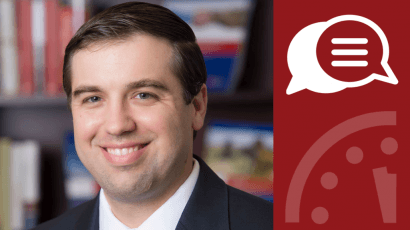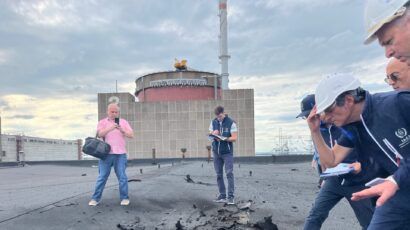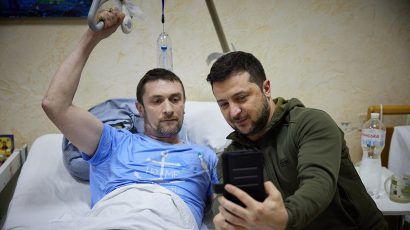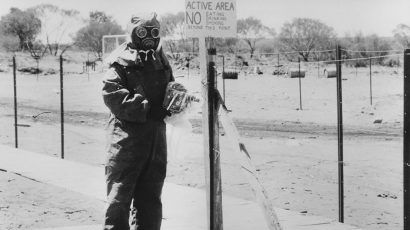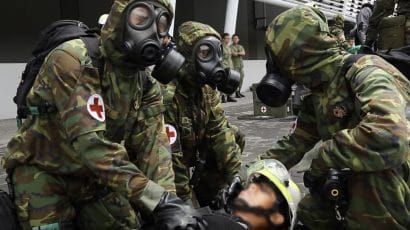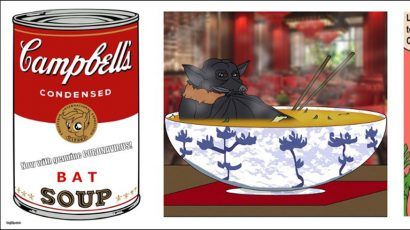Search results for nuclear terrorism
It's clear from this roundtable discussion that recent advances in biotechnology are outstripping the legal and normative bulwarks designed to prevent the misuse of the life sciences for hostile purposes. The challenge of managing biorisks is complicated by the fact that the relevant technologies are diffusing globally and are driven primarily by innovation in the … Continued
After the fall: Bitcoin’s true legacy may be Blockchain technology
Bitcoin's value dropped in half in six months. But the underlying technology—the blockchain—that enabled such "cryptocurrency" may prove to be a more enduring legacy.
Russia invaded Ukraine, but imposing financial sanctions like SWIFT may not be the best path forward.
To really bring the pain, the United States and its allies need to coordinate its financial sanction against highly targeted Russian energy and financial services companies—and not so much the broad-based, indiscriminate financial weapons like SWIFT
Don’t fear the robopocalypse: Autonomous weapons expert Paul Scharre
A former Army Ranger—who happens to have led the team that established Defense Department policy on autonomous weapons—explains in a Bulletin interview what these weapons are good for, what they’re bad at, and why banning them is going to be a very difficult challenge.
US official: Russian invasion of Ukraine risks release of dangerous pathogens
A US official worries that the conflict in Ukraine could lead to damage at laboratories holding dangerous pathogens.
The feud with Iran: A Saudi view
Anyone who has followed recent headlines knows there has been much tension recently between the rulers of Sunni-dominated Saudi Arabia and Shiite Iran—including the execution of a Shiite cleric who had criticized the kingdom’s treatment of its Shiite minority, the subsequent ransacking of the Saudi Embassy in Tehran two days later, a Saudi cutoff of … Continued
Why nuclear weapons should be a major focus of the 2020 campaign
The proverbial alien beamed down to Earth would find the situation quizzical indeed: The political debates and campaigns involved in selecting the most powerful person on the planet—the US president—scarcely mention the stark fact that any president could at any time be called to decide, almost instantly, whether to order a nuclear attack that would lead to the end of civilization and, possibly, the human species.
How the United States and NATO can deal with Russian nuclear coercion in Ukraine
US and NATO support to Ukraine should be firm, but calibrated to avoid nuclear escalation, a former US ambassador to Russia and former deputy secretary-general of NATO argues.
It is 6 minutes to midnight
We are poised to bend the arc of history toward a world free of nuclear weapons. For the first time since atomic bombs were dropped in 1945, leaders of nuclear weapons states are cooperating to vastly reduce their arsenals and secure all nuclear bomb-making material. And for the first time ever, industrialized and developing countries alike are pledging to limit climate-changing gas emissions that could render our planet nearly uninhabitable.
Wargame shows attacks on reactors would cause meltdowns and military paralysis
A wargame reveals how the United States and its allies are unprepared for attacks on nuclear power plants in Europe.
Here’s what Western leaders need to remember about Zelensky’s emotional appeals
Ukrainian President Zelensky has made repeated, emotional calls as Russia continues its assault. But if Western policymakers leave their emotions about war unchecked, they may not make the best policy decisions.
1958: Only world government can prevent the war nobody can win
Coexistence is the only alternative to nonexistence, writes the famous philosopher.
Iron Dome: Behind the hoopla, a familiar story of missile-defense hype
Since an Israeli-Hamas ceasefire was announced in November, Israel's Iron Dome system has been hailed as proof that missile defense has emerged from the realm of the theoretical and assumed the status of a real battlefield weapon. It's also been called a game changer for the Israel-Palestine conflict. The verdict is in, crowed Max Boot, a defense expert at the Council on Foreign Relations in New York: "Missile defense works."
The psychological pandemic: Can we confront our death anxiety?
The Biden administration’s task could not be more daunting. But wise political decisions can mitigate the worst effects of collective death anxiety brought on by the COVID-19 pandemic, while a decrease in national dread makes for better, fairer, and more rational politics. Confronting death anxiety together can be a source of personal and collective renewal.
How to keep the new coronavirus from being used as a terrorist weapon
The possibility that extremist groups may attempt to deliberately spread SARS-CoV-2—the virus causing the current pandemic—should not be ignored. In fact, one of the primary limiting factors to such an attack—recruiting humans willing to infect themselves—does not apply in this case; potential perpetrators would come from the ranks of those already infected. So we are faced with a genuinely challenging task: preemption.
A pandemic of bad science
Compared to public health crises of the recent past, there has been a distinct change in how science is communicated to the public. Experts no longer control the narrative through trusted outlets, and, accurate or not, social media allows anyone to craft their own narrative about science and publish it to an audience of millions.
Going viral
We've been lucky. The avian influenza (H5N1) virus that first emerged in Hong Kong in 1997 -- which killed six and caused 18 serious illnesses -- has not acquired the ability to spread easily from person to person. Virtually all of the reported cases have involved contact with infected birds or bird products.
Biosecurity 2.0: Enduring threats in the former Soviet Union
The announcement sent ripples throughout the international health community: On April 23, 2010, the World Health Organization (WHO) confirmed that seven children suffering from paralysis in the poor former Soviet country of Tajikistan were victims of poliomyelitis. Genetic sequencing showed that the virus had probably arrived with a traveler from India. It was the first importation of polio into Europe since 2002, when the region was certified as polio-free.
The message from Strasbourg
On December 20, 2011, the European Court of Human Rights in Strasbourg, France, ruled that the "use of gas against terrorists during the Moscow theatre siege was justified." It did not, that is, violate the right to
Gene drives: The good, the bad, and the hype
It’s good to be cautious about any powerful new technology, but the best approach to Crispr and gene drives will be one based on empirical findings rather than hype.



